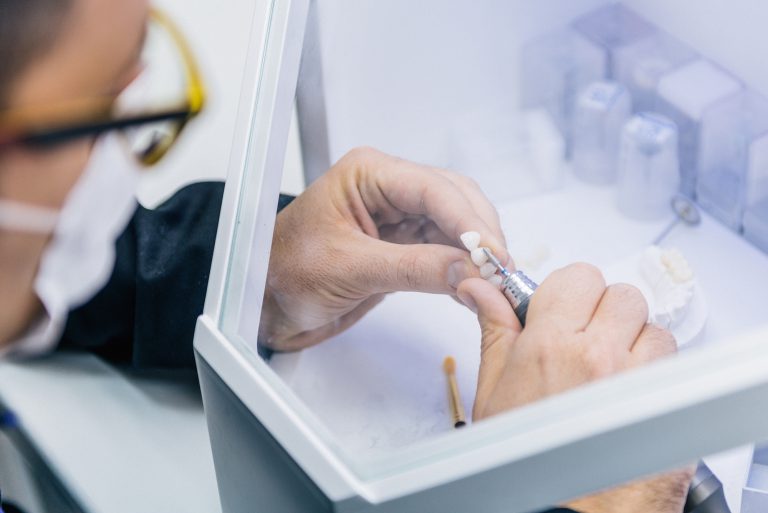
What Are Dental Implants?
A dental implant is a small, metal screw, typically made of titanium, that serves as a replacement for the root of a missing tooth. During a minor surgical procedure, the dentist places the implant directly into the jawbone at the site of the missing tooth. This implant acts as a sturdy anchor for a dental restoration, like a crown, which completes the tooth’s structure above the gum line.
Google Verified Patient Reviews
Why You Might Need Dental Implants
Your natural teeth play a crucial role in supporting the structure and aesthetics of your smile, enabling comfortable eating and speaking. A gap left by a missing tooth can lead to other teeth drifting out of alignment, increasing the risk of oral health issues. Losing even a single tooth can set off a cascade of negative effects on your oral health, facial appearance, and overall quality of life.
Additionally, one unavoidable consequence of missing teeth is bone resorption. This natural process involves the breakdown of non-essential bone tissue, which the body repurposes elsewhere. When teeth are present, they stimulate the jawbone, promoting the growth of new bone tissue. However, once teeth are lost, this stimulation stops, leading to the gradual deterioration of the jawbone. This can result in a shortened jaw and chin, leading to wrinkles and giving your face a sunken appearance.
Dental implants offer a solution nearly as good as having natural teeth. By replacing lost teeth with implants, you can prevent or correct these issues, maintaining the health and aesthetics of your smile.

Benefits of Dental Implants
- Restore Your Natural Appearance: Dental implants are designed to look and feel like your natural teeth. They are custom-made to blend seamlessly with your smile, matching the size, shape, and color of your natural teeth.
- Comfort and Stability: Dental implants are anchored directly into your jawbone, where they fuse with the bone over time. This provides a stable base for attaching crowns, bridges, or implant-supported dentures, ensuring that your replacement teeth do not shift or cause pain.
- Improved Bone Strength: Unlike other tooth replacement options, implants stimulate new bone growth around the implant site, which can help strengthen and preserve the jawbone.
- Long-Term Solution: With proper care, including regular brushing, flossing, and dental check-ups, dental implants can last for decades.

Dental Implant Restorations
- Dental Crown: Typically covers a single-tooth implant, replacing one missing tooth.
- Dental Bridge: Used to span the gap where multiple teeth are missing. A bridge can be supported by one or two implants.
- Implant Denture: Provides more stability than a traditional denture by attaching to two or more implants.

A New Life With Dental Implants Awaits!
Your smile won’t be the same after you get a dental implant; it’s going to be much better.
Dental implants are easy to maintain and care for. Gently brush and floss your implant daily and protect it from injury while playing sports. Visit us periodically for checkups so that we can make sure your implant is staying healthy.
In return, your dental implant could reward you with many years of strong, happy, and beautiful smiles!
Start Today By Booking A Consultation
Experience with Dental Implants
Despite the thought of having a metal implant inserted into your jawbone, the procedure is less painful than many expect. Local anesthesia is used to eliminate discomfort during the surgery. Advanced dental techniques allow for quick, accurate, and minimally invasive placement, reducing discomfort and recovery time.
Post-surgery, some swelling and discomfort are normal but generally manageable with prescribed care. Most patients report a quick recovery and minimal discomfort during the healing process.
Dental implants are highly successful, boasting a success rate of nearly 95%, making them one of the safest and most reliable procedures in dentistry.

What to Expect on Your Dental Implant Treatment Journey
Embarking on a dental implant treatment can be a significant decision, but knowing what to expect can make the experience much smoother and less daunting. Here’s a breakdown of the typical stages you’ll go through during your dental implant journey.
Assessment
Your journey begins with a detailed consultation. During this initial meeting, your dentist will determine if you are a suitable candidate for dental implants. This involves taking X-rays and possibly a 3D cone-beam CT scan to assess the quality and quantity of bone tissue in your jaw—essential for supporting the implant. Additionally, your dental team will take either a digital scan or a physical impression of your teeth. This step is crucial for planning the correct placement and angle of your implant to ensure it integrates seamlessly with your bite and aesthetic.
Inserting the Implant
The next step is the implant placement. To ensure you’re comfortable and pain-free during the procedure, an anesthetic will be administered, numbing the surgical site. The dentist will then make a small incision in your gums to access the bone where the implant, a small titanium post, will be inserted. Depending on the situation, sutures may be required to close the gum over the implant.
Healing Period
After the implant is placed, a crucial healing period follows. This phase, often spanning several months, allows the implant to integrate with the bone, a process known as osseointegration. During this time, it’s essential to follow your dentist’s care instructions closely to ensure successful healing and avoid complications.
Finalizing the Restoration
Once your implant has fully integrated with the jawbone, you’ll return to the dental office for the final step. During this visit, your dentist will attach the dental restoration—typically a crown, bridge, or denture—onto the implant. This restoration has been custom-made to match the color, shape, and size of your natural teeth, ensuring it blends perfectly with your smile.
Completion
By the end of your treatment journey, you will have a fully functional, aesthetically pleasing tooth that not only feels like your own but also restores your ability to chew and speak comfortably. Dental implants are renowned for their durability and can last many years with proper care, including regular brushing, flossing, and dental check-ups.
This comprehensive approach ensures that every aspect of your dental health and aesthetic needs are met, leaving you with a smile that is both beautiful and functional.
Start Today
Consider beginning your journey to a better smile by scheduling a consultation. Call 604-227-1221 to discuss your options and plan your treatment. This proactive step can lead to many years of strong, healthy, and beautiful smiles with dental implants.
Cost of Dental Implants in Burnaby
If you’re considering dental implants in Burnaby, you can expect to pay approximately $3,000 – $6,000+ for a single implant. The costs can significantly vary depending on the extent of your needs. For full-mouth reconstructive dental implants, prices range from $6,000 to $60,000 and up, depending on the complexity and scope of the procedure. A full set of implant-supported dentures typically averages around $30,000.
Determining the Cost of Dental Implant Surgery
- Type and Number of Implants: More implants generally mean higher costs
- Materials and Supplies: High-quality materials might increase the price
- Dental Team’s Experience: Experienced professionals may charge more, but can also offer greater expertise and efficiency
- Surgery Complexity and Location: Complex procedures in difficult-to-access locations can increase costs
- Recovery Time: Extensive aftercare and longer recovery times can also contribute to the overall cost
The cost of dental implant surgery is influenced by several factors:
Because of these variables, it’s crucial to have a personal consultation and oral examination. This allows the dentist to evaluate your specific circumstances and discuss various treatment options. During this consultation, you can receive a more accurate cost estimate tailored to your needs.
Alternatives to Dental Implants
For those with 1 to 3 missing teeth, dental bridges might be a suitable and less expensive alternative. For more extensive tooth loss, such as an entire arch or full mouth, options include various types of dental prosthetics or removable dentures.
Comparing Costs and Benefits
While the initial investment in dental implants may be higher than other tooth replacement options like bridges or dentures, implants offer significant long-term benefits. They are more secure and durable, often lasting a lifetime with proper care, which involves routine brushing, flossing, and regular dental check-ups. Unlike removable prosthetics, which may require ongoing adjustments and replacements, implants are cared for just like natural teeth.
Considering these factors can help you make an informed decision about whether dental implants are the right choice for your dental health and financial situation.
Frequently Asked Questions
Dental implants typically have a very high success rate, often cited around 95% or higher. This rate can vary depending on factors like the health of the patient, the quality of aftercare, and the expertise of the dental team. The precise positioning and the patient’s oral hygiene also play critical roles in the long-term success of the implant.
With proper care and maintenance, dental implants can last a lifetime. The crown attached to the implant typically lasts 10-15 years before it might need replacement due to wear and tear. However, the titanium implant itself can remain securely fused in the jawbone indefinitely, provided that the surrounding tissue remains healthy.
Yes, in some cases, dental implants can be placed immediately after a tooth is extracted, known as “immediate implants.” This option is convenient and can reduce overall treatment time. However, not everyone is a candidate for immediate implants; suitability depends on the amount of remaining bone tissue and the absence of infection.
After receiving a dental implant, it’s advisable to avoid chewy, hard, or sticky foods for a few weeks to prevent undue pressure on the implant as it heals. Smoking and chewing tobacco should also be avoided as they can hinder the healing process and negatively affect the long-term success of the implant.
Dental implants require the same level of care as natural teeth, which includes brushing twice a day, flossing daily, and regular dental check-ups. However, your dentist might recommend special cleaning tools like interdental brushes to help clean around the implant site and under the crown. While implants are not susceptible to decay like natural teeth, the gum area around them can still suffer from gum disease if not properly maintained.






